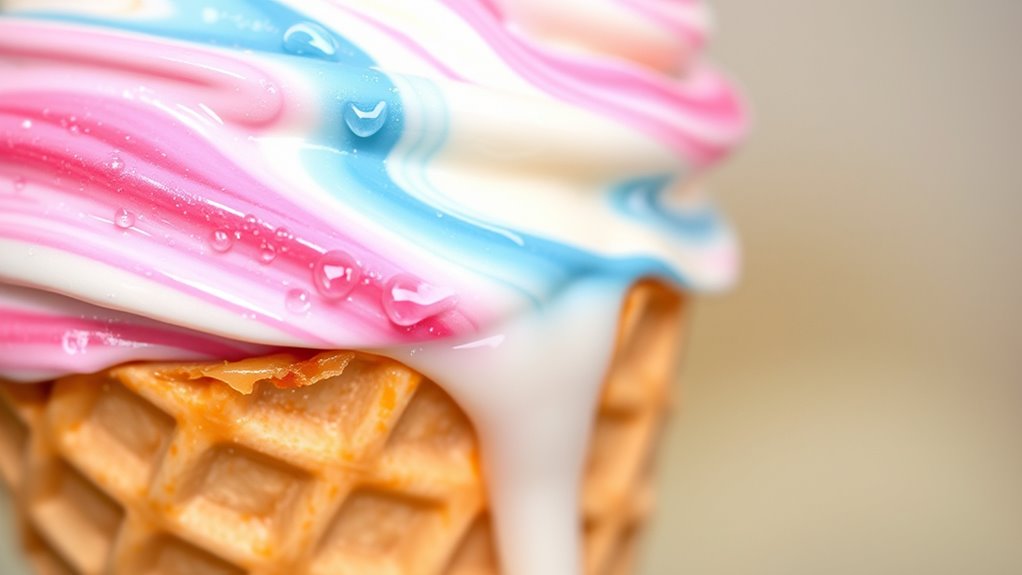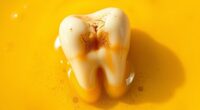Eating ice cream can cause cavities because the sugars in it feed the bacteria in your mouth, which produce acids that break down your tooth enamel. The more often and longer your teeth are exposed to sugary ice cream, the higher your risk. Drinking water afterward, or cleaning your teeth later, can help protect your smile. If you want to know more about how to keep cavities at bay while enjoying treats, stay with us.
Key Takeaways
- Ice cream’s sugars feed oral bacteria, producing acids that erode tooth enamel and cause cavities.
- Higher sugar content in ice cream increases the risk of dental decay over time.
- Consuming ice cream quickly and rinsing with water afterward can reduce cavity risk.
- Good oral hygiene, like brushing after eating, helps remove residual sugars and protect teeth.
- Limiting frequent or prolonged ice cream intake supports better dental health and cavity prevention.

Eating ice cream can be a delightful treat, but it also poses certain risks to your dental health. One of the main concerns is the potential for dental decay, which develops when bacteria in your mouth feed on the sugars left on your teeth. When you indulge in ice cream, especially if it’s loaded with added sugar, you’re providing these bacteria with a quick source of energy. As they digest the sugar, they produce acids that attack your tooth enamel, the protective outer layer. Over time, this acid erosion can lead to cavities, making your teeth more vulnerable to damage and sensitivity.
Your sugar intake plays a significant role in this process. The higher the sugar content in your ice cream, the more fuel you’re giving bacteria to produce harmful acids. Even if you opt for lower-sugar or sugar-free varieties, you still risk dental decay if you don’t maintain good oral hygiene. It’s essential to be mindful of how often you indulge, as frequent consumption of sugary treats increases the chance of acid attacks on your teeth. Sipping or holding ice cream in your mouth for long periods extends exposure to sugar and acid, heightening the risk of decay.
To minimize the impact, consider eating ice cream quickly rather than slowly savoring it. The less time your teeth are exposed to sugar and acids, the better. Drinking water afterward helps wash away residual sugar and neutralize acids, reducing their harmful effects. Brushing your teeth about 30 minutes after eating ice cream is also vital, as it removes lingering sugar and bacteria before they can cause more damage. Using fluoride toothpaste adds an extra layer of protection, strengthening your enamel against future decay.
It’s also wise to balance your diet with foods that support dental health, like crunchy fruits and vegetables, which naturally clean your teeth and stimulate saliva production. Saliva is your mouth’s natural defense against acids because it helps neutralize them and remineralize your enamel. If you frequently enjoy ice cream, consider scheduling regular dental checkups. Dentists can spot early signs of decay and provide treatments or advice to help safeguard your teeth.
Frequently Asked Questions
Can Eating Ice Cream at Different Times Affect Cavity Risk?
Your dental timing and eating habits definitely influence cavity risk. When you eat sugary foods like ice cream at different times, you may expose your teeth to acids and bacteria more frequently or less often, affecting decay. Snacking on ice cream regularly or late at night can increase cavity chances. To protect your teeth, try to limit sugary treats and brush or rinse soon after indulging, maintaining good dental timing habits.
Are Sugar-Free Ice Creams Safer for Teeth?
You might be surprised to learn that sugar-free ice creams are generally safer for teeth, reducing cavity risk. About 60% of people believe they’re completely cavity-proof, but sugar substitutes like xylitol can still cause dental erosion if eaten excessively. While they don’t promote cavities like regular sugar, overdoing sugar-free options can lead to enamel wear. So, enjoy in moderation, and always maintain good oral hygiene for healthy teeth.
How Does Ice Cream Compare to Other Sweets for Cavities?
When comparing ice cream to other sweets, you notice that its sugar content varies, but it often has high sugar levels that can harm your teeth. Its creamy texture and smooth consistency may stick to your teeth longer, increasing cavity risk. Unlike candies with hard textures, ice cream melts faster, reducing prolonged contact. Still, moderation is key, as frequent indulgence in sugary treats, including ice cream, can lead to cavities over time.
Do Certain Flavors of Ice Cream Impact Dental Health Differently?
Like a painter choosing colors, your choice of ice cream flavor influences your dental health. Some flavors, with high flavor acidity, can erode enamel more than others, while dairy content helps neutralize acids and protect teeth. You should be mindful of tart or citrus-infused ice creams that may cause more harm, versus creamy, less acidic options. So, pick your flavors wisely to enjoy your treat without risking your smile.
Can Ice Cream Cause Sensitivity or Damage to Tooth Enamel?
Eating ice cream can cause sensitivity or damage to your tooth enamel, especially if it’s very cold or high in dairy content. The cold temperature of ice cream can trigger nerve sensitivity, making your teeth ache. Additionally, the acidity and sugar in ice cream can weaken enamel over time, increasing your risk of erosion. To protect your enamel, enjoy ice cream in moderation and consider rinsing your mouth afterward.
Conclusion
So, next time you indulge in ice cream, remember the silent thief lurking behind the sweetness—cavities. Like the fairy tale villain hiding in plain sight, sugar feeds the bacteria that attack your enamel. But with good habits and moderation, you can enjoy your favorite treat without inviting trouble. Think of it as dancing with the wolf—stay alert, keep your teeth strong, and savor every spoonful without fear.









